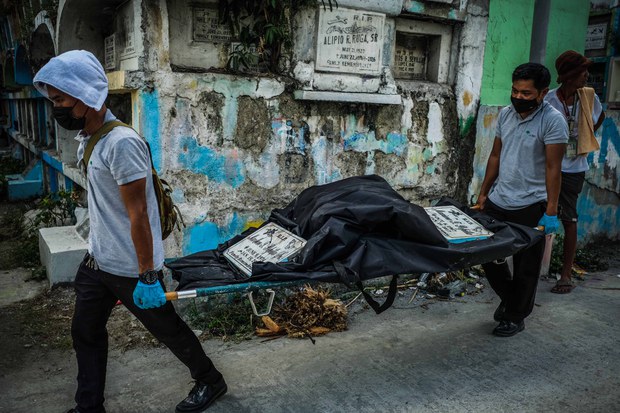European legislators meet Philippine senators in ‘tense’ briefing on Duterte drug war
2023.02.22
Manila
 Funeral workers carry the remains of two victims of then-President Rodrigo Duterte’s drug war that were exhumed from a public cemetery in Navotas, Metro Manila, after the lease of a rented crypt expired, Feb. 28, 2022.
Funeral workers carry the remains of two victims of then-President Rodrigo Duterte’s drug war that were exhumed from a public cemetery in Navotas, Metro Manila, after the lease of a rented crypt expired, Feb. 28, 2022.
European legislators met with their Philippine counterparts from the Senate in Manila on Wednesday, in what a senator described as a “tense” briefing about former President Rodrigo Duterte’s war on drugs.
The meeting came ahead of an investigation by the International Criminal Court (ICC) into Duterte’s alleged crimes against humanity.
Sen. Ronald dela Rosa, who had served as Duterte’s national police chief and launched his bloody drug war, claimed that a member of the European Union parliamentarians’ delegation raised his voice at the Philippine politicians.
Dela Rosa said Spanish legislator Miguel Urban Crespo was “hot” and questioned a Senate resolution that sought to protect Duterte from the ICC. Dela Rosa told reporters that he answered him by demanding respect for Philippine sovereignty.
“I said, if you know your history, we were conquered and ruled by Spain for 300 years. Now that we have gained our freedom, we have gained our independence, we expect that other countries should respect our sovereignty,” dela Rosa told reporters.
German politician Hannah Neumann, the head of the European Parliament Subcommittee on Human Rights delegation, countered dela Rosa’s take on the closed-door meeting.
“It was not tense. It was an open and critical discussion that in the end was more constructive than tense,” Neumann told reporters.
Philippine Sen. Francis Tolentino, who was also at the meeting, said there was no shouting match.
“No one raised their voice. I have to correct that,” he said.
Dela Rosa led the national police from the beginning of Duterte’s term in 2016 until 2018 as the president’s drug war heated up.
About 8,000 suspected dealers and addicts were killed in Duterte’s drug war during his time in office, according to police statistics. Rights groups said the figure could be three times higher, noting many others were killed by pro-Duterte vigilantes they suspect were working with police.
One of the drug war’s victims, Diego Bello Lafuente, a Spanish surfer and businessman, was killed by police in the southern island of Siargao in 2020. Three police officers had claimed Lafuente pulled a gun during a search, triggering a shootout that led to his death – they had gone into hiding, but surrendered to authorities Feb. 9.
Deep concern
During the meeting, Neumann said the delegates raised their concern over the extrajudicial killings, adding that while the administration of President Ferdinand Marcos Jr. has initiated an investigation, they find the process slow.
On Saturday, Marcos said his government would not allow the ICC to conduct its own investigation in the Philippines, where he claimed the justice system was intact and working fine.
“My position hasn’t changed and I have stated it often even before I took office as president, that there are many questions about their jurisdiction and what we in the Philippines regard as an intrusion into our internal matters and a threat to our sovereignty,” Marcos said.
“So no, I do not see what their jurisdiction is. I feel that we have in our police, in our judiciary, a good system. We do not need assistance from any outside entity,” he said.
Neumann, meanwhile, stressed that the European Parliament was “deeply concerned” at the pace of the investigation, noting that fewer than two dozen cases against police officers had been filed.
“We, as the European Union, are members of the Rome Statute. We support the ICC and we see this as a potential to support the investigations into the killings. We clearly understand that the senators we met right now see this differently,” she said.
Neumann and Crespo were joined by European parliamentarians Ryszard Czarnecki, Isabel Wiseler-Lima and Karsten Lucke.
The Philippines’ Tolentino, for his part, said senators who were against the ICC intervention were able to “clearly state” the Marcos administration’s position.
“We are asking for their respect for what our country and leadership is doing as a sovereign state. We are not part of the ICC. They respect that,” he said.
“And through our dialogue, albeit not heated, we were able to explain our position.”
Jojo Riñoza in Manila contributed to this report.







